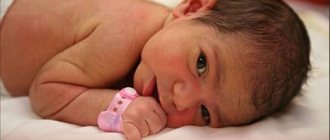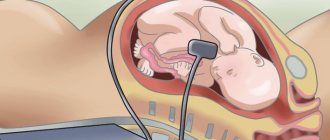The third trimester covers the period from the 27th to the 40th week of pregnancy. This is the time during which the body of the expectant mother will fully prepare for childbirth and adapt to the needs of the baby. In the last three months, there has been a dynamic change in the figure - every week the belly becomes bigger and bigger. The third trimester is the time when all the unpleasant symptoms of pregnancy intensify, and new ailments also appear. Emotions begin to dominate common sense - the first fears associated with the birth of a child and motherhood appear. The third trimester of pregnancy is a good time to find a suitable maternity hospital, purchase all the necessary things for the baby and arrange a room for a new family member, as well as attend courses in preparation for childbirth and life with a child.
Changes in the body in the third trimester
In the third trimester, the child grows especially intensively, which affects not only the general condition of the mother, but also the functioning of internal organs, in particular the gastrointestinal tract. The child is less and less able to move freely, so all his “acrobatics” are especially clearly felt. Its mass also increases, which increases the load on the spine, and a significantly stretched uterus causes compression and stagnation of blood in the pelvic veins. This leads to the appearance or worsening of pain in the lumbar region, varicose veins, and can also cause hemorrhoids and swelling of the ankles. Changes also affect the organs of the genitourinary system. During this period, an exacerbation of infections is possible, which should be diagnosed and eliminated as early as possible.
In the last trimester of pregnancy, the uterus begins to prepare for childbirth, and training contractions called Braxton-Hicks contractions appear. These are uterine contractions that can be noticed after 20 weeks of pregnancy. Contractions usually last about 30-45 seconds.
Possible problems in the third trimester
Unfortunately, in the third trimester of pregnancy, many ailments can occur, which are mainly caused by the growing uterus and the active enlargement of the fetus. For many women, the third trimester is a rather tiring time.
Tachycardia
Tachycardia is an increase in heart rate above 100 beats per minute.
During this period, blood volume increases significantly - by about 40-50%, and in pregnant women with increased body weight this value can reach 80-90%. This means the heart must beat faster to pump the right amount of blood to maintain adequate blood pressure. Another cause of heart palpitations may be hyperthyroidism or anemia. Pregnancy can also worsen pre-existing arrhythmia.
Heartburn
If there was no heartburn before, then in the third trimester it is almost impossible to avoid. Constant heartburn in the last weeks of pregnancy is due to the fact that the enlarging uterus puts pressure on the stomach. As a result, the contents of the stomach are pushed into the esophagus, causing unpleasant discomfort.
Low water
A decrease in the amount of amniotic fluid can develop against the background of infectious pathologies or fetal malformations. Intrauterine infections of the fetus that develop as a result of diseases of the genitourinary system of the expectant mother can also provoke oligohydramnios. Another provoking factor for the anomaly is considered to be diseases of the respiratory system, in particular influenza.
Insomnia
Insomnia in the third trimester is a common condition for expectant mothers. Spinal pain, a large belly, frequent visits to the toilet and cramps do not naturally contribute to quality sleep. In addition, psychological factors also influence the onset of insomnia, especially during the first pregnancy. The closer the expectant mother gets to her due date, the more fears and anxiety she has. In this case, you should talk to your doctor and perinatal psychologist and try to solve the problem of insomnia.
Edema
Swelling during this period of pregnancy is physiological (a consequence of increased blood volume and pressure from the enlarged uterus on the vein that drains blood from the lower body to the heart) and is not something to worry about. But if swelling is accompanied by increased blood pressure or the presence of protein in the urine, a doctor’s consultation is required.
Diarrhea
Diarrhea in the third trimester of pregnancy can be caused by the body's reaction to hormonal changes, an enlarged uterus and the development of the fetus. Diarrhea in the 9th month can be caused by increased stress due to the approaching due date. Diarrhea is also a signal of impending labor.
If diarrhea is accompanied by general weakness, fever, or abdominal cramps that gradually become painful and severe, this may indicate placental abruption. An ambulance is required.
Lower back pain
A change in the center of gravity, extra pounds, and lack of movement increase pain in the spine. In addition, when the body prepares for childbirth, it produces more relaxin, a hormone responsible for weakening the pelvic ligaments.
Spinal exercises during pregnancy are the most effective way to get rid of back pain. If the expectant mother feels well and the doctor has not identified any contraindications, starting from the second trimester, you can do pregnancy fitness, following the principle that prevention is better than cure.
Bleeding from the nose
In the third trimester, nosebleeds often indicate an exacerbation of chronic diseases. It can also be caused by blood pressure problems and anemia, which are often diagnosed at the very beginning of pregnancy, so the doctor applies appropriate countermeasures or prescribes the necessary medications.
Signs of thrush
Thrush, or vaginal candidiasis, develops in almost half of women during pregnancy. Unpleasant itching, burning in the vagina and white, curd-like discharge are typical symptoms of infection that require treatment under the supervision of a gynecologist.
You should be aware that in the third trimester of pregnancy, heavy clear or clear white vaginal discharge may appear, which is not associated with infection and is not accompanied by the above-mentioned symptoms.
Polyhydramnios
Polyhydramnios (polyhydramnios) affects approximately 1.5% of pregnant women, often in multiple pregnancies. Polyhydramnios is diagnosed when the amount of fluid in the third trimester of pregnancy exceeds 2000 ml or when the AFI index is > 25 cm. The amount of amniotic fluid is assessed by a doctor based on an ultrasound examination.
The prognosis for pregnancy complicated by polyhydramnios depends on the cause of the increase in amniotic fluid.
Dizziness
During the third trimester of pregnancy, dizziness is associated with pressure from the uterus on important blood vessels and increased energy needs. You should also monitor your iron levels, as iron deficiency increases drowsiness and can cause dizziness.
At all stages of pregnancy, dizziness can be a result of gestational diabetes or gestational anemia.
Cloudy urine
In the last stage of pregnancy, a change in the color of urine may be associated with infectious and inflammatory processes of the pelvic organs or late gestosis. The presence of kidney stones or sand in the bladder will also affect the clarity of the urine.
Temperature
A slightly elevated body temperature during pregnancy is normal and very common and, as a rule, does not affect the health of mother and baby. However, a high temperature in the last trimester may indicate the presence of a viral infection, intoxication, urinary tract infection, toxoplasmosis and chickenpox. If fever develops, you should call a doctor at home, a specialist will select treatment tactics that will minimize the risk of possible complications.
Prevention
Dizziness during pregnancy can often be avoided by resorting to the simplest preventive measures. The following simple rules should be followed:
- Do not stay in a stuffy or unventilated room for a long time.
- Avoid hyperinsolation.
- Avoid stress.
- Do not accept an uncomfortable body position.
- Maintain a full motor regime.
Dizziness should not cause alarm, however, if a symptom develops, it is better to consult a doctor to rule out pathology. During pregnancy, this condition is usually quite natural and goes away completely after the birth of the child.
Some preventative and precautionary measures can completely eliminate the development of severe dizziness during pregnancy. Be healthy!
Observation by a doctor in the third trimester
From the 30th week of pregnancy, prenatal care begins, which should include an appointment with an obstetrician-gynecologist and a third ultrasound examination. In addition, appropriate tests and consultations with specialized specialists, usually a hematologist, ophthalmologist, or ENT doctor, are prescribed.
From the 30th week of pregnancy, working women are entitled to maternity leave; the doctor will issue all the necessary documents for its registration.
After the 36th week, it is recommended to visit the obstetrician weekly in order to timely identify the possibility of premature birth.
Tests in the third trimester
In the third trimester of pregnancy, each expectant mother must pass the following laboratory and instrumental tests:
- general urine analysis;
- detailed blood test;
- Hbs antigen testing (hepatitis B);
- detection of antibodies to toxoplasmosis;
- cardiotocography (CTG);
- obstetric examination;
- Ultrasound.
Other control tests in the third trimester of pregnancy:
- checking fetal heart function (auscultation);
- assessment of vaginal discharge;
- woman's weight control;
- assessment of fetal mobility;
- Wasserman reaction to detect syphilis, which is carried out at the beginning and end of pregnancy;
- determination of vaginal cultures for the presence of type B streptococci (can be localized in the genital tract).
Diagnosis of the causes of gestosis
To make a diagnosis and assess the degree of a pregnant woman’s condition, the following studies are extremely important:
- regular blood pressure measurement;
- blood test for hemoglobin, platelets and hematocrit;
- blood clotting test;
- blood biochemistry, coagulogram;
- Fetal ultrasound;
- Fetal CTG;
- Dopplerometry of the vessels of the fetus, placenta and uterus.
You will find more information on our website. By calling or filling out an application on the website, you can make an appointment with a doctor who will talk about diagnosing the causes of gestosis and methods of prevention.
Baby development in the third trimester
Now the elements of the child’s spine are beginning to form - 33 vertebrae, 150 joints and more than 600 muscles. Blood vessels and alveoli develop and the nostrils open. From the 28th week of pregnancy, the baby recognizes his mother’s voice - so you need to try to talk to him as much as possible. At the 29th week the nervous system is already developed, the child reacts very quickly to stimuli.
Between the 29th and 33rd weeks of pregnancy, the baby's brain enters a phase of rapid development and is able to control breathing and regulate body temperature. His body has already acquired basic immunity, thanks to which the baby can fight mild infections.
During the last two months of pregnancy, the baby's weight doubles, and in the last four weeks the baby gains 50 g per day.
Useful tips in the third trimester
In the third trimester of pregnancy, it is recommended to visit an obstetrician-gynecologist every two weeks. Around the 30th week, it is recommended to start searching for a suitable maternity hospital and attend antenatal classes.
Advice! Make a list of necessary items for the hospital in advance, do not leave it until the last minute.
Exercises for pregnant women: preparing for childbirth
At this stage of pregnancy, the most important are relaxation exercises, which will help relax the muscular corset and reduce the severity of back pain. Any physical activity during pregnancy should only be done under the supervision of an experienced professional.
Back pain and muscle spasms are considered an inevitable part of pregnancy, although it's worth knowing that expectant mothers can effectively counteract them with regular, low-intensity exercise.
Nutrition for pregnant women: features of the third trimester
The diet for pregnant women should consist of proteins, dairy products, fruits, vegetables and carbohydrates present in every meal. In the third trimester, calcium is extremely important, which is necessary for the formation of the baby's bones. Also in the third trimester, a woman should consume at least 2,300 calories per day.
What vitamins should I take?
Due to the fact that in the third trimester the fetus needs more calcium to build bone mass, it is advisable to take it as a dietary supplement, in addition to vitamin D3.
There are a variety of vitamins intended specifically for pregnant women; your doctor will help you choose the best one.
Childbirth preparation courses
One of the important components of successful childbirth and comfortable motherhood is the information and physical preparation of a woman. Every antenatal clinic has courses for expectant mothers, where they will tell you the following:
- Stages of the birth process. Possible medical interventions are caesarean section, epidural anesthesia.
- How to relieve pain during childbirth using breathing, massage and comfortable birth positions.
- The first days of caring for your baby - basic hygiene and daily routine.
- Breastfeeding - how to establish breastfeeding and what options for assistance are available (pacifiers, specialized formulas).
Preparing to move to the maternity hospital
The main preparation is to collect things for the maternity hospital. Usually, the doctor can provide a ready-made list of items needed for mother and baby in the hospital. The standard things you will need are the following:
- Children's bodysuits (with short or long sleeves depending on the season), socks, hats, envelopes.
- Disposable diapers, wet wipes, anti-irritation cream, personal hygiene products.
- Baby bottles, pacifiers, specialized formulas if breastfeeding is not possible.
How does dizziness manifest?
Dizziness is an insecure feeling of oneself and a feeling of instability of one’s own body, when it seems that everything around is moving, floating in a circle, balance is lost, the floor disappears from under one’s feet.
Manifestations of dizziness:
- weakness;
- it gets dark in the eyes;
- nausea;
- noise and/or ringing in the ears;
- fingers and toes go numb;
- feeling of coolness throughout the body;
- impaired coordination of movements.
If dizziness is accompanied by weakness, tinnitus and nausea, fainting is possible! Call an ambulance immediately! Lean on the support and don't move.
Photo source: shutterstock.com







